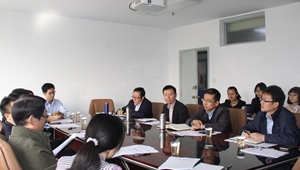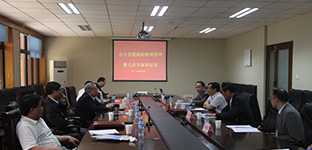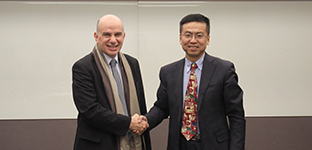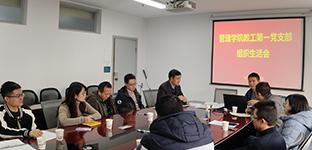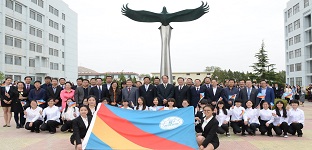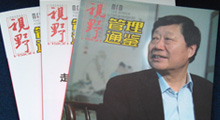国际合作
Global Cooperation
2. 兰州大学研究生学术道德规范 - English Version
Regulations on Academic Ethics of Postgraduates
Chapter 1 General
Article 1 In order to enhance the postgraduate educational quality, defend academic ethics, clarify academic discipline, regulate academic conduct, foster academic atmosphere, reinforce academic integrity, encourage academic innovation, the Regulations on Academic Ethics of Postgraduates of Lanzhou University is laid down.
Article 2 The Regulations apply to all postgraduates of Lanzhou University, including PhD candidates and master’s degree pursuers.
Chapter 2 Fundamental Regulations on Academic Ethics
Article 3 During the research, graduates should rigorously abide by Copyright Law of P. R. China, Patent Law of P. R. China, Guidelines on Scientific Ethics of Researchers (Draft) issued by Chinese Science Association, and other laws, rules, social morals or academic regulations. They should also adhere to science and truth, respect scientific rules, advocate scrupulous academic attitude, commit to exploration and innovation, stick to professional ethics and defend scientific integrity. The following fundamental regulations on academic ethics are what should be adhered to.
(1) In academic activities, graduates must respect intellectual property and research achievements made by others, giving clear citations or notes to other’s work. The quotation should not be presented as the main body or contents. The re-quoted work should clarity its sources.
(2) Collaborative work should be reviewed by all listed authors before publication. All authors should sign confirmation letter, holding responsibility for the work. Project leader shoulder the primary responsibility.
(3) Graduates should be object, impartial and precise in evaluating their own or other’s work. The evaluation should be based on a full range of domestic and international materials and data.
(4) Respect research subjects (both human being and non-human being). If human being is involved, their legal rights and privacy should be protected and the right-to-know should be ensured.
(5) Adhere to integrity and objectiveness in project application, project design, data collection and analysis, research publication, confirmation on the contribution, and etc. Data collection and publishing should ensure validity and accuracy, guaranteeing the intactness, authenticity and security of experimental record and data, for the sake of re-checking. The published research findings and statistical data should be authentic, intact and accurate. Acceptance and correction to the mistakes and shortages existed in publications must be appropriately made.
(6) Honestly and scrupulously cooperate with others. Patiently and sincerely treat academic critics and doubts.
(7) Significant contributors enjoy the right of authorship. General or assisting contributors are exclusive in authorship. The order of co-authors should in accordance with actual contribution (unless there are agreed rules or agreement). The authors are bound to be responsible for the work, reviewing and signing before publication.
(8) Pursuit of inappropriate interests through scientific activity is prohibited. Properly treat the direct, indirect and potential interests in research.
Chapter 3 Misconducts
Article 4 Misconducts indicate forgery, plagiarism, fabrication and other infractions during research and academic events. All graduates are prohibited from the following misconducts:
(1) Cheating, plagiarism and forgery: plagiarize or paraphrase other’s academic findings, opinions, ideas or experimental data and survey results. Against professional ethics, use other’s important academic proposals, assumptions, ideas or research plan without acknowledgement.
(2) Intentionally reach untrue description and forge data or conclusions, damaging the intactness of original data. Falsify, make up or revise experimental data, conclusions, notes or citations.
(3) Forgery of academic experience. When submit curriculum vitae and academic experience for honors, awards and scholarship, untruthfully report personal CV, academic experience and achievements, forge experts evaluation, certificates or other materials to prove academic capability.
(4) Submit the same piece of work to more than one organization for publication.
(5) Untruthfully present research achievements: submit fake research achievement, repeatedly apply for the same awards, or freely enhance the level of academic achievement, dishonestly categorize the author, editor, translator, and etc.
(6) Improper use or abuse the authorship: list those as co-authors even without participating in the research or writing. List those as co-authors without permission. The order of authors is disproportional with the contribution. Harm other’s copyright. Intrude other’s authorship right and exclude the creative contributor in the list of authors.
(7) Inappropriately interfere or obstruct other’s research, including intentional damage or detention of the other’s indispensable equipment, documents, research proof, files and other relevant property. Intentionally impose illegal competition on competitive projects.
(8) Participate or conspire with others in concealing academic misconducts, including participation in academic forgery, complicity in concealing the misconducts or failing to report, retaliating against the complainant.
Chapter 4 Responsible Organizations and Duties
Article 5 Supervisors, the schools and relevant departments of the University assume the following responsibilities in safeguarding the academic ethics and integrity.
(1) The relevant departments of the University should lay down policies on regulations of academic ethics and launch extensive propaganda to graduates. The schools should reinforce the education and management of academic ethics, strengthening the inspection and review on graduates’ adherence to academic ethics. Supervisors should rigorously follow the academic ethics, consciously setting a good example for graduates, and integrate the academic ethics as the crucial component in graduates’ education, shaping their down-to-earth learning attitude and maintaining the academic integrity.
(2) The University should list the academic ethics education as compulsory section of graduate orientation, and thoroughly emphasize it during the whole graduate education. The academic conduct should be the important component of applying for honors, awards, scholarship, dissertation defense and degree. These activities must rigorously investigate the applicant’s adherence to academic ethics. Once the infractions or issues damaging the University’s interest and reputation are found, veto is carried out.
(3) The offenders must be investigated rigorously in accordance with procedures. The clear judgment must be reached. If the breaching is authentic, the offenders will be sanctioned depending upon the severity. If the offenders have earned the degree, the University Degree Awarding Committee will be proposed to rescind the degree.
(4) The University and the school must report the offences and sanctions to the graduate and his or her supervisor in time.
Article 6 The Academia Construction Committee (ACC), sub-branch of the University Academic Committee, is the highest investigation organ in addressing academic misconducts. It is in charge of reviewing the guidelines, policies and regulations of academic ethics of the University, analyzing, researching the existed problems and proposing suggestions, investigating and arbitrating intellectual property dispute, academic misconducts, and etc.
Article 7 The coordinating team, composed of Science and Technology Division, Social Science Division, School of Graduate, Discipline Committee and Inspection Division, assists ACC in investigating and assessing the complaints involved with graduates’ academic ethics, carrying out the sanctions.
Chapter 5 Complaints and Judgment of Academic Violations
Article 8 Anyone is entitled to submit complaints about the graduate academic misconducts to the schools or divisions. If the schools or divisions fail to handle or improperly handle the complaint, it can be reported to ACC.
(1) On receipt of complaints or finding out offences with basic evidence, ACC can authorize the experts of the research field or members (at least 3 people) of the academic committee of the suspected school to participate in the investigation. If the accused involving with managers of the school or members of the academic committee, ACC can appoint professional experts to organize a relatively independent team to investigate.
(2) If the participators of the investigation, including members of ACC or discipline experts, members of academic committee of the school, who are involved in the violations, or share immediate circle with the accused, should consciously avoid or withdraw from the investigation team. When the accused prove that the investigators are his or her special stakeholders and they are unsuitable to participate in the investigation, he can ask for the evading of these investigators with the permission of directors of ACC.
(3) For the complaints to be investigated, it is necessary to listen to the reports of both the complainant and the accused, shaping written investigation report, submitting which to ACC. The conclusions of the report should be voted anonymously.
(4) ACC should submit the written investigation report to both the complainant and the accused. Within the regulated days of receiving the report, both the complainant and the accused can submit their disagreement with the report in writing.
(5) ACC will review in accordance with guidelines regulated by the University Academic Committee, render the judgment and sanctions, and submit the sanctions to the University Academic Committee.
(6) Participators of the investigation are bound to keep confidential of the procedures and materials during the process of handling the complaints and conducting investigation. Leakage of investigation and sanctions are prohibited. They should also properly protect the complainants, the accused and witnesses.
Chapter 6 Sanctions and Appeal
Article 9 ACC will render the judgment on sanctions depending upon the seriousness.
(1) For those intruding other’s copyright, reputation right or patent right, they will subject to corresponding legal liability according to the articles of Copyright Law, General Principles of The Civil Law and Patent Law of P. R. China.
(2) Graduates against professional morals and the Regulations will be sanctioned depending upon the severity. The sanctions include: reprimanding and reporting all over the university, critic, warning, serious warning, reporting a demerit, probation, dismissal, exclusion in applying for honors, awards and scholarship. If their misconducts pose significant losses to the university and have serious impact, the graduates will be expulsed from the university. If the accused has graduated with a degree, the degree is proposed to be evocated.
(3) The University will render the final decision in accordance with ACC’s suggestions. The sanctions notification will be submitted to both the accused and the complainant. The sanction determination will be reported within certain circle.
Article 10 If the accused and the complainant does not accept the sanctions, within 15 working days of receiving the notification, they can appeal in accordance with article 61, 62 and 63 of Regulations on Student Management of General High-Level Institutions issued by Ministry of Education. The sanction determination is valid even during the appeal period.
Article 11 If the suspected schools, management departments or responsible figures intentionally conceal the truth and delay the sanctions, they will subject to corresponding sanction and administrative penalty.
Article 12 The investigation results should be public within certain circle and subject to inspection of all over the University.
Chapter 7 Appendix
Article 13 The Regulations take effective on the day of issuing.



